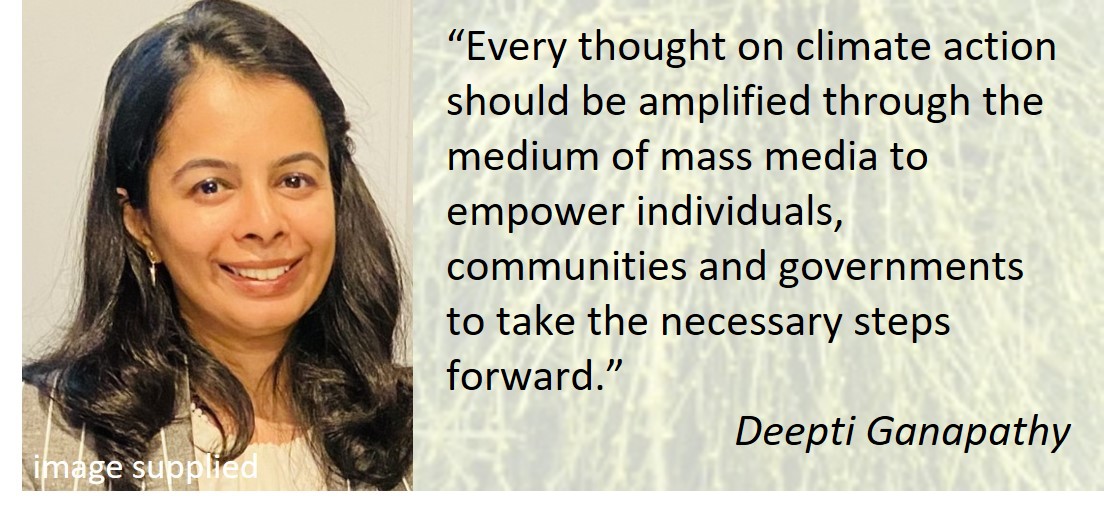
Assistant Professor Deepti Ganapathy recently presented “Mapping Climate Change through a macrocosm – a UNESCO-Tagged World Heritage Site in India” at the University of Queensland (UQ) as part of the School of Communication and Arts’ (SCA) Research and Seminar Series. The thought-provoking presentation was held at UQ’s St Lucia Campus and also online.
Currently Visiting Assistant Professor at Indian Institute of Management Bangalore (IIMB) and an affiliate researcher at the Centre for Climate Change Communication at George Mason University, Assistant Professor Ganapathy is the author of the 2022 book Media and Climate: Making Sense of Press Narratives (Routledge, UK, 2022). She was in Queensland in order to present a paper on ‘News Coverage of Climate Change as a Public Health Issue: A Decade-Long Analysis of News in the US, China, and India’ at the 74th International Communication Association (ICA) Conference with co-authors based in the United States of America and Hong Kong.
A former journalist, Assistant Professor Ganapathy continues to write for media including Deccan Herald and Forbes India. When asked to share her thoughts on the role of mass media in climate change communication, Assistant Professor Ganapathy stated: “Every thought on climate action should be amplified through the medium of mass media to empower individuals, communities and governments to take the necessary steps forward. Working in silos is not an option. We need collective efforts and a huge effort from the media in particulate to keep the Climate narrative consistent, correct and clear.”
The event was hosted by Centre for Communication and Social Change (CfCSC) Affiliate and UQ SCA academic, Dr Aparna Hebbani. Other CfCSC Affiliates in attendance included UQ’s Senior Lecturer Dr Skye Doherty, and Teaching Associate – Communication and Journalism/ CfCSC Communications Officer Dr Kylie Navuku.
From the School of Communication and Arts, UQ, Research Seminar and Workshop Series website:
"Abstract"
"Home to around 50 million people, the Western Ghats consist of 4,156 villages across six states, running north to south over a distance of approximately 932 miles, with peaks ranging from 1,030 to 2,695 meters above sea level, rainfall ranging from 80 to 320 centimetres on an average. They are the source of major river systems, including the Cauvery, Krishna, Godavari, Palar and Pennar basins. According to documented reports, the Western Ghats cover barely 5% of India’s forest area but are home to 1,800 species endemic to the region and consists of 27% of all the species of higher plants recorded in the Indian region. They are also a hub of economic activity – where mini hydel power projects, tourism and many industries thrive. The Western Ghats were declared a World Heritage Site by UNESCO in 2012. This tag brought along with it a myriad of restrictions on industries in the region.
The reports that appeared in the Press had several implications, especially for the Media industry (i) how do they co-produce news? (ii) what importance is attached to news related to climate change? (iii) what factors are at play while editorial decisions either project or downplay a climate event? (iv) how does the media industry balance corporate interests while tackling scientific evidence? (v) why does a COP summit have themes that communicate an overarching message?
Through her analysis of newspaper reporting, the speaker has in her book, debated about the conundrum that surrounds communicating about the issue of climate change."
"Deepti Ganapathy has 18 years of practitioner and academic experience with India’s leading media and education conglomerates- these include The Times Group, Deccan Herald, NDTV, IIM Indore and School of Business Management, NMIMS University. At IIM Bangalore, she teaches Communication courses for the MBA programme and offers several Executive Education courses. She has been Program Director for various custom and short-duration programmes, and offers Open Programs on Sustainability and Communication.
Her research has been published in leading management journals such as the Academy of Management Learning and Education, as well as in highly ranked Communication journals such as Journalism, International Journal of Strategic Communication. She has contributed book chapters in books edited by renowned scholars globally and published by Sage and Emerald on Social Media and Measurement and Computer-Mediated Communication.
She is the author of the recently published book “Media and Climate Change: Making Sense of Press Narratives”, which explores the socioeconomic and cultural understanding of climate issues and the influence of environment communication via the news and the public response to it. Her book has been well received globally and she has been invited as a plenary speaker at prominent Climate Conferences and as a speaker to research centers in Universities in the US and EU doing work around the themes of Sustainability and Climate Change Communication. Her book was listed in the Honour Book list 2022 in the Business Category in the Green Literature Festival."



